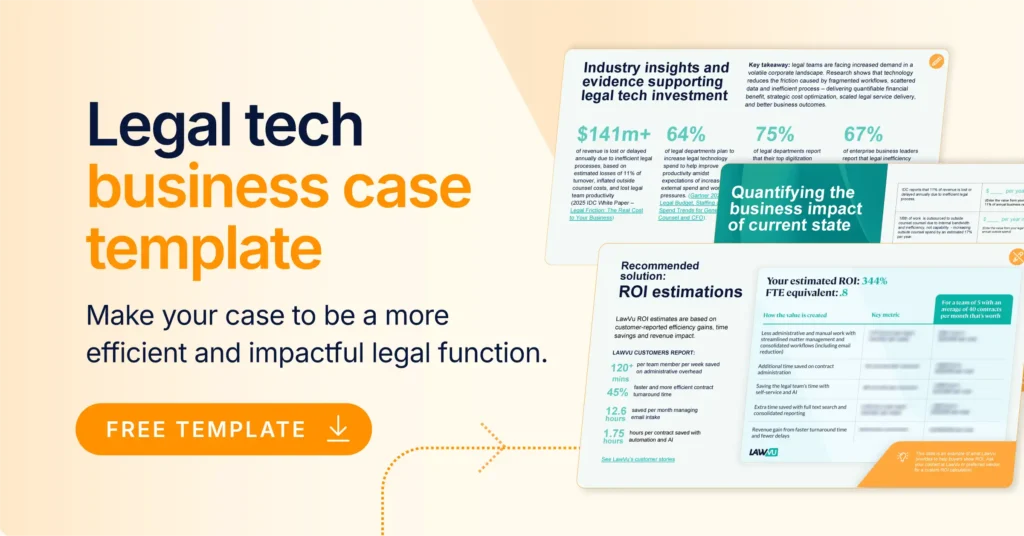Blueprint for a smarter legal function: Why your CFO is the key to building it

Every General Counsel knows the moment: the business is scaling, the legal team is stretched, and a major investment finally feels within reach – until the CFO asks, “What’s the ROI?” For today’s modern legal teams, that question isn’t just about numbers, it’s about partnership. When legal and finance move in sync, transformation stops being a budget request and starts becoming a business strategy. Drawing on insights from LawVu CLO and EVP Advocacy David Lancelot and Thumbtack CFO Larry Roseman, we explore why partnering with your CFO is essential to building a smarter, stronger in-house legal function.
For years, in-house legal teams have talked about transformation – moving from reactive risk managers to proactive business leaders. But for most General Counsels, the obstacle hasn’t been vision. It’s been alignment.
According to Gartner’s Legal Budget, Staffing and Spending Trends for General Counsel in 2025, nearly two-thirds of legal departments plan to increase technology investment this year, and almost half expect to expand headcount. Yet most still admit they lack the operational maturity, data, or systems to scale efficiently. Budgets aren’t growing in proportion to complexity, and legal leaders are expected to do more with the same resources.
The only sustainable way forward is partnership – particularly with the person who owns the financial narrative of the business: the Chief Financial Officer.
“Finance and legal speak different languages,” says Lancelot. “But we’re dropped in together to run the business. When those two functions align, everything changes – the level of trust, the quality of decision-making, and the ability to make the case for transformation.”
The idea that legal and finance are natural allies isn’t new. What is new is how essential that relationship has become in shaping the modern legal function – one that is data-driven, tech-enabled, and integrated into business strategy.
The CFO: Legal’s most under-used ally
CFOs today are under immense pressure from boards and investors to drive enterprise efficiency. Legal, meanwhile, is under pressure to prove it. This shared accountability creates fertile ground for collaboration, yet most legal leaders admit the relationship isn’t where it needs to be.
In a recent LawVu webinar poll, only around 10 percent of in-house legal leaders said their finance team fully understands the legal function’s value or resource needs. Another 60 percent said, “there are gaps,” and about 20 percent described the partnership as “a work in progress”. The takeaway: there’s recognition of value, but not yet a shared language for articulating it.
That misalignment shows up most clearly when it comes to funding transformation. Another LawVu poll found that 60 percent of legal teams “occasionally” build successful business cases but struggle to frame their requests in terms CFOs understand. In short, they’re selling legal efficiency – but CFOs are buying business outcomes.
Roseman says that’s where many legal leaders miss the mark. “It’s not about giving money back,” he explains. “It’s about creating more scale and impact with the same envelope of money. The CFO isn’t just looking for cost reduction – we’re looking for leverage.”
That leverage often appears in predictable moments: before an IPO, during material transactions, or as part of company-wide modernization. Gartner’s research echoes this: legal operations hiring has increased from 33 percent to 74 percent in the past three years, driven by the need to optimize workflows, reduce reliance on outside counsel, and support digital transformation mandates coming directly from boards.
In this environment, CFOs expect legal to come to the table not with anecdote or urgency, but with data, foresight, and a clear business case.
Building trust before the budget cycle
Trust is the currency of influence. And, as Lancelot points out, it can’t be minted overnight. “You’ll get more from the relationship if you’ve built trust before you need it. Don’t wait for budget season to start talking to finance. Be curious about how the company makes money and where it’s going. Ask questions about financial goals, margins, and strategy. The more you understand that world, the more credibility you’ll have in your own.”
Both leaders agree that visibility is key. At Thumbtack, Roseman ensures legal has a seat at the table by design. “We bring finance, legal, and HR together regularly,” he says. “We have a shared rhythm with the CEO because most of the issues we deal with cut across all of us. It creates efficiency – but more importantly, it builds connection.”
That connection pays dividends when legal needs support. Lancelot recalls his own turning point: “I knew I’d succeeded when the CFO said in a leadership meeting, ‘David knows his numbers better than anyone else.’ It took years, but that was the moment I knew I could move our agenda forward.”
The principle is simple but powerful: be visible before you’re vital. Join finance meetings. Volunteer for cross-functional projects. Show that legal isn’t a silo but a strategic enabler.
Understanding what finance values
CFOs live in a world of metrics, predictability, and risk balancing. To earn their confidence, legal must translate its goals into that language. That means shifting from “what legal needs” to “what the business gains”.
Roseman outlines several scenarios where CFOs expect legal investment, and where they’re most receptive to business cases:
- Public company readiness. For venture-backed businesses, readiness begins 18–24 months before IPO. “You’ll need people, systems, and processes in place long before the S-1,” Roseman says.
- Material transactions. M&A and financing deals create “spiky” workloads. CFOs expect legal to plan for these cycles – deciding when to scale internally or rely on external resources.
- Risk and audit management. Enterprise risk and cyber resilience are now board-level priorities. “CFOs know you can’t insure against everything,” Roseman notes. “They want a partner in risk mitigation, not a surprise.”
- Modernization. Efficiency and scalability through technology. Gartner reports that 64 percent of legal departments will increase tech spend in 2025 but warns that efficiency gains will depend on investing in legal intake, workflows, and data foundations.
This last point is where many GCs falter. Technology requests often sound like overhead, not impact. But the CFO’s language is one of returns and risk-adjusted outcomes. If you can demonstrate that new systems reduce external spend, shorten contract cycles, or generate measurable savings, you’ve entered the conversation on their terms.
Making the case: From legal spend to strategic investment
When it comes to winning finance buy-in, clarity and credibility matter more than ambition. Lancelot recommends aligning every legal initiative with strategic business objectives, not just operational improvements.
“The business doesn’t care how many contracts you process. They care how fast you enable deals, how well you protect revenue, and how predictably you manage risk.”
That shift requires data fluency – a theme Gartner reinforces across its research. Legal leaders who can show metrics like time-to-contract, outside counsel savings, or matter resolution times build stronger, evidence-based cases. But data is only the starting point; storytelling still matters.
CFOs, like boards, invest in narratives of value creation. A persuasive business case answers three core questions:
- What problem are we solving, and what’s the cost of doing nothing?
- How will this initiative support business growth or protect enterprise value?
- What’s the return – in financial, operational, or risk-mitigation terms – and how will we measure it?
Roseman appreciates legal leaders who bring this discipline. “Bring me through your thinking,” he says. “Be transparent about knowns and unknowns. I’d rather have an open conversation about uncertainty than hidden assumptions or buffers.”
That transparency builds credibility, and credibility builds leverage. Once Legal demonstrates it can forecast accurately and manage costs responsibly, the CFO becomes a partner, not a gatekeeper.
The operational shift: data, technology, and scale
Legal’s evolution from gatekeeper to business accelerator depends on more than people – it depends on systems. Gartner’s report highlights a clear direction: automation, AI, and digital tools are no longer optional. They’re board-level expectations.
“The push for efficiency through technology isn’t coming from legal,” Lancelot says. “It’s coming from the top – from the CFO, the CEO, and the board. They want to see productivity increase and operating costs decline. Legal has to show it’s part of that story.”
Modern legal functions are embracing operations as strategy: using matter management, intake systems, and analytics to track workload, outcomes, and ROI. It’s not about “adding tools,” Lancelot stresses, but about building infrastructure for insight.
Without that infrastructure, legal transformation is anecdotal. With it, legal becomes a data-driven business unit that can quantify its impact in terms the CFO recognizes. “People won’t trust you unless you understand what’s going on in the business; that means knowing your numbers, your metrics, and how your work drives strategic outcomes,” Lancelot adds.
This operational mindset is reshaping how CFOs and CEOs hire legal leaders. As Roseman notes, “We’re looking for business leaders who happen to be lawyers – people who can think about scale, efficiency, and systems.”
From cost center to competitive advantage
The relationship between legal and finance is no longer transactional; it’s transformational. CFOs aren’t just approving budgets – they’re helping design the architecture of modern legal functions.
As legal teams mature, the question shifts from “How do we cut cost?” to “How do we create capacity?” – and capacity, when properly measured and funded, becomes competitive advantage.
In that sense, partnering with the CFO isn’t a tactical step – it’s a strategic imperative. It repositions legal as a growth enabler, a risk optimizer, and a data-intelligent advisor.
Gartner’s research underscores that nearly half of all legal departments plan to increase staffing in 2025, but warns that without investment in operations and analytics, those hires will fail to deliver productivity gains. The CFO knows this and will support legal functions that can show how their resources translate into business outcomes.
“We’re not just spotting and mitigating risk anymore, we’re accelerating the business,”– David Lancelot on “this is the heart of modern in-house leadership”.
That acceleration requires cross-functional trust and a shared definition of value. When legal and finance align on data, metrics, and outcomes, the conversation stops being about cost and starts being about contribution.
The future-ready legal function
The modern General Counsel must now blend legal expertise with business acumen and operational literacy. Those who do will find that the CFO isn’t an obstacle – they’re a catalyst.
“The CFO doesn’t want to say no,” Roseman notes. “They want to invest – but wisely. If you can show efficiency, scalability, and measurable impact, you’ll always have their ear.”
As the business environment grows more complex, this partnership will define the next generation of legal leaders. The CFO brings financial rigor and strategic alignment; the GC brings judgment, foresight, and governance. Together, they can design a legal function that not only protects the enterprise but powers its growth.
And that, says Lancelot, is the new standard: “When legal and finance work in sync, you stop asking for permission. You start co-creating the future of the business.”
The most effective GCs of the future won’t just manage risk – they’ll manage relationships. They’ll treat finance not as a hurdle but as a partner, building shared language, trust, and data to drive transformation.
With the right tools, and the right ally in the CFO, legal can become what every board now expects: a strategic, scalable, and future-ready function that powers the business forward. If you want to find out more about LawVu’s legal workspace, click here to book a personalized demo now.
What your CFO will ask
- How does this initiative support business strategy or revenue growth?
- What’s the measurable ROI – in efficiency, cost savings, or risk mitigation?
- Can this be self-funded through productivity gains?
- What benchmarks or data support your assumptions?
- How will success be tracked and reported?
- What risks remain, and how will they be managed?



